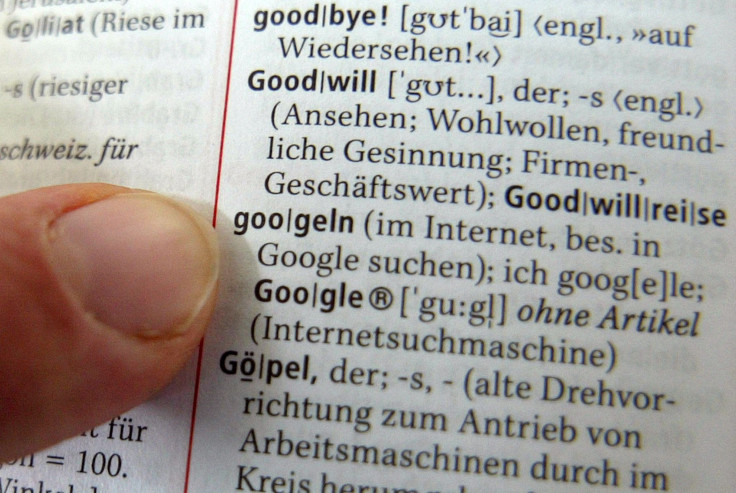Deep Web, Revenge Porn And Microaggression Are Just Some of Dictionary.com’s Latest Additions

Dictionary.com announced the first of its quarterly dictionary updates last week, and the tech, gender and race-related words that were added reflect the zeitgeist and its concerns. Among the additions? "Deep web," "haptics," "glanceable," "dox," "revenge porn," "bigender" and "microaggression."
Words can be added to the online dictionary so frequently because its lexicographers (the diligent word nerds who scan language usage in all media and compile dictionaries) are not bound to -- well, a bound dictionary hard copy.
“Dictionary.com is celebrating its 20th anniversary,” Rebekah Otto, the site's director of content, told International Business Times. “We’re one of the earliest online dictionaries. Random House stopped publishing the dictionary in 1995, when the World Wide Web was still called the World Wide Web, and our core proprietary dictionary is based on the Random House unabridged.”
Dictionary.com continues to be updated by a team of around 10 lexicographers – some of whom have been working on the Random House dictionary since the 1960s. Groovy!
There are many benefits to a dictionary being online, among them, unlimited space, which eliminates the need to create perplexing abbreviations. “When we moved it from print to digital, there was a huge impact on legibility,” said Otto. “There are a lot of conventions in the dictionary started in the print alone – like abbreviating parts of speech to save paper/pages of print.”
Easier Updates
And because language is a living thing, being online makes updating the dictionary easier.
“It meant a lot for a dictionary to put out a second edition in the past, so the jump between the first and second edition of something like the Oxford English Dictionary was decades and decades of work," said Otto. There were ways to overcome these limitations, and occasionally, dictionaries like the OED would publish supplements in between dictionary updates, including words that would be incorporated into the next edition.
Being online also makes it easier to keep up with new words and words whose meaning continues to shift.
“Words have all these new channels to acquire usage much more quickly than they used to,” Otto said. “And we have the capability to update them more often.” Dictionary.com updates at least quarterly.
And how does Dictionary.com decide what words to add in these updates? Lexicographers scan anything from academic journals, pop-culture sources and user suggestions, as well as analyze search lookups, to try to figure out what people are interested in better understanding.
Is 'On Fleek' Too 'Basic' For Dictionary.com?
“Every update includes thousands of revisions and edits to the current dictionary,” said Otto. “It’s not just about the new words, but also about words that are attaining new meaning, new instances of existing words in English -- like ‘basic.'"
Dictionary.com lexicographers have seen an uptick in user searches for gender-related words, so the last update's addition of "cisgender" is now joined by "bigender"and "agender." They're more frequently used, Otto said, so the searches increase. "One thing we think about a lot is... how language operates in sets," said Otto. "Often times when we’re adding 'cisgender,' we’ll think about all the other words like 'woman' and 'man' and 'gender' that relate to the word we’re actually thinking of editing."
Otto explained that although "Mx.," the honorific being added to the Oxford English Dictionary to represent transgender people and people who don't want to be identified by gender, is "on our radar," she said it's not being added to Dictionary.com. "It’s been a trend in Britain more than in the U.S."
And what about the ubiquitous "on fleek," which Urban Dictionary defines as "the quality of being perfect, or on point"?
"It hasn’t achieved wide enough usage across language to be added to the dictionary in this particular update," Otto said. "We're continuing to monitor how it changes." If it's added, there will be a notation, Otto said. "As lexicographers, we can use labels to show our users that this is a word you’re going to hear, but you probably won’t use it with your professor."
Dictionary.com's New Words

agender: relating to a person who does not have a specific gender identity or recognizable gender expression.
anecdata: anecdotal evidence based on personal observations or opinions, random investigations, etc., but presented as fact.
astroturfing: the deceptive tactic of simulating grassroots support for a product or cause undertaken by people or organizations with an interest in shaping public opinion.
basic: characterized by predictable or unoriginal style, interests, or behavior.
bigender: relating to a person who has two gender identities or some combination of both.
blackhat: a hacker who violates the security of a system for personal profit or for the gratification of causing damage.
dark web: the portion of the Internet that is intentionally hidden from search engines, uses masked IP addresses, and is accessible only with a special browser.
dox: to publish the private personal information (documents) of another person without consent.
glanceable: relating to information on an electronic screen that can be understood quickly or at a glance.
haptics: the study or use of tactile sensations and the sense of touch as a method of interacting with computers and electronic devices.
microaggression: a subtle but offensive comment or action directed at a minority or other nondominant group that is often unintentional or unconsciously reinforces a stereotype.
mRDC: mobile remote deposit capture: a method of depositing a check by using a mobile device to scan an image of it and transmit the image to a bank.
parallax: a 3D effect observed when images and other elements in the foreground of a screen move at a different rate than those in the background.
revenge porn: sexually suggestive images of someone, typically a former romantic partner, that are posted online without the person’s consent.
© Copyright IBTimes 2025. All rights reserved.






















